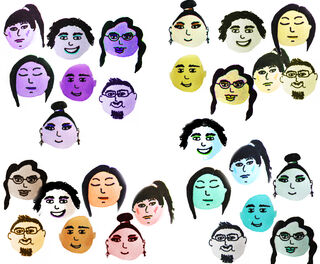Empathy
Disagree, But Understand Why
Understanding in-group/ out-group bias with cognitive empathy improves relations
Posted March 10, 2021 Reviewed by Lybi Ma

I write a great deal about how the unconscious influences behavior and how our own minds deceive us. This post focuses on one such way, in-group / out-group bias, and builds on my recent post, “Civility Is Overrated,” to discuss how differences can be approached more effectively. Many months ago, I made a note to write about cognitive empathy after hearing a couple of podcasts that focused on it.
In-Group / Out-Group Bias
I identified a bias in the post: “The Top 20 Ways You Are Lying to Yourself.” This is common and affects everyone a lot of the time. The theory: When we come in contact with someone strange to us, whether visually or in other ways, we decide if they are with us or against us. This may seem extreme and you may think you do not do this, but you do. It stems from evolutionary time when it was necessary to quickly determine if an outsider was a danger. The human mind works quickly, and much of its processes happen without conscious awareness. Quickly, people are grouped into one’s group, or outside of it.
In the podcast episode, “The War for Kindness” (Santos, 2020) researcher Mina Cikara tells a story of how she quickly descended into in-group / out-group bias at a baseball game, despite having no interest in baseball or either team. She discusses how once labeled a Red Sox fan at Yankee stadium she behaved in ways congruent with this label and found herself behaving in ways she never believed she would.
In-group / out-group bias has been demonstrated in many studies and often occurs without conscious awareness. People unconsciously put themselves in groups of us versus them over a multitude of issues. And once one identifies with a group, one’s decision-making is then influenced by the identification with that group. There is an abundance of studies that demonstrate this. In one, when the same legislature is shown to Republicans and they are told it is put forth by Republicans they support it, but when told it is put forth by Democrats they do not, and the same is true for Democrats (Cohen, 2003).
Unconscious Processes
In the podcast episode “Socks and Crocs” (McRaney, 2020) cognitive researcher Pascal Wallisch discusses how unconscious cognitive processes are at work in how we perceive color in ambiguous situations (think back to the dress that was blue and black for some, and gold and white for others). Wallisch’s research focused on this phenomenon, and how our priors (experiences with different lighting in this case) led to radically different perceptions. He states near the end of the two-part podcast, “Your brain gives you the end result of this processing. There’s about, in the primate brain, about 30 processes in visual perception, …as far as I know, you do not have conscious access to these 30 steps, only the result.” (McRaney, 2020, 52:08). This is true of just about all mental processes, not just vision. Many in neuroscience believe even when a reason is created for a behavior, it is often inaccurate, or the bias confabulation (creating a plausible reason for a behavior where the reasoning is unknown).
How Previous Experience Affects Perception
Though Dr. Pascal Wallisch’s research used visual manipulations to demonstrate how prior experiences in different light affected our perception, his work can be applied to any disagreement. Wallisch’s research demonstrated his theory about “the dress” and demonstrated how people’s priors (previous experiences) affected their perception. How can this not be the case with things other than vision? Is it that difficult to accept, after all the evidence in psychology that supports it, that the mind, though a great tool, is not always trustworthy?
The term priors can be used to describe all aspects of a person’s experience. Though cognitively, humans understand we all have different backgrounds and experiences, because we are so similar there is a tendency to think of others more similarly than different. (I once heard an expert say if aliens abducted one human, they would understand 90 percent about any human). The expectation is that with the same information everyone comes to the same conclusion. Though we are extremely similar, it would be beneficial to understand how every other individual’s mind can come to different conclusions because of their history.
Everyone has different priors, and these sometimes lead the mind to different conclusions. Rather than looking at others who have a different opinion as strange, deranged, or worse (again, it is the mind’s nature to categorize those differing from us in some “them” fashion) perhaps one can understand that different prior experiences led to a different focus and different conclusion. Ekhart Tolle put it well: “If her past were your past, her pain your pain, her level of consciousness your level of consciousness, you would think and act exactly as she does.” With this understanding comes cognitive empathy.
Cognitive Empathy and Questioning Your Cconclusions
In the post “Civility Is Overrated” Ohad Fedida and I make a case for difficult discussions occurring, despite the general populace’s aversion to them. It is not difficult to accept that part of this aversion is due to negative judgments made about the other side, as well as attachment to one’s own beliefs. The human brain has evolved to make quick (though not always accurate) decisions and to then support that decision.
Additionally, the human mind is often quick to defend. Since society has evolved much quicker than the human brain can, and since most of us are not under constant threat for our lives, the mind looks for threats and finds them when there is disagreement. This raises defenses, and as can be seen in the evolutionarily related body language of crossing one’s arms in front of you (to protect vital organs from attack). The human brain perceives bodily threat in words and disagreement.
The solution is cognitive empathy. Cognitive empathy is also perspective-taking. The key to this, many believe, is curiosity. But to be curious, one must recognize his defenses, recognize that this is an unconscious response to a perceived threat and in-group / out-group bias, and be willing to go against his nature and produce curiosity. This can be a difficult transition.
The solution begins with questioning one's own conclusions. It begins with understanding that the mind has evolved to identify others as with us or against us, to see threats where there is none, and to come to conclusions that are sometimes false. When you can release some of your attachment to your conclusions, remember the mind is fallible, and realize defense is not necessary, you can look at your contemporary with different views with curiosity. With this curiosity, you can explore each other’s experiences to see if any inaccurate assumptions have been made, and can try to understand one another’s prior experiences and how that influences perception (and thereby, conclusions).
With this, more productive discourse can ensue (which most experts believe is necessary rather than the avoidance of difficult topics). It takes work. It takes fighting the default network in which the mind works, or at least understanding it and reducing its influence. It takes courage to lower defenses. But with this approach, with more cognitive empathy, one can be closer to a serene state despite disagreement. Anyone can be a calm, objective, response [rather than reactive] focused on a retreat where everyone is being mindful. But applying it in everyday life is the goal.
Copyright William Berry, 2021
References
Cohen, G.L., 2003. Party Over Policy: The Dominating Impact of Group Influence on Political Beliefs. Journal of Personality and Social Psychology, 85(5), 808–822. https://doi.org/10.1037/0022-3514.85.5.808
McRaney, D., March 9, 2020. Socks and Crocs (175 / 176) [Audio Podcast Episode]. In You’re Not So Smart. https://youarenotsosmart.com/2020/03/09/yanss-175-how-a-divisive-photog…
Santos, L., (Host). June 22, 2020. The War for Kindness (9) [Audio Podcast] In The Happiness Lab, Pushkin Industries. https://www.happinesslab.fm/season-2-episodes/episode-9-the-war-for-kin…




